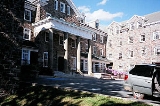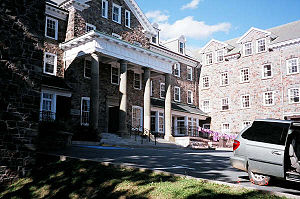
Shirreff hall
Encyclopedia

Dalhousie University
Dalhousie University is a public research university located in Halifax, Nova Scotia, Canada. The university comprises eleven faculties including Schulich School of Law and Dalhousie University Faculty of Medicine. It also includes the faculties of architecture, planning and engineering located at...
in Halifax, Nova Scotia. It was utilized as a single-sex female dormitory until September 2005.
Shirreff Hall consists of four 'houses'; Old Eddy, New Eddy, Newcombe and The Annex. In total, the maximum capacity of the building is 451 students. The building is located at 6385 South Street on the corner of South Street and Oxford Street, on the Studley campus.
History
Shirreff Hall was built in response to a looming housing crisis for female students of Dalhousie University. In the early 1920s, female students accounted for over twenty percent of the university's population. There were no university residences, and landlords in the Halifax area tended to prefer male tenants. Plans for a female-only residence hall were drafted, but no finances were available due to the construction of the Science Building and the Macdonald Memorial Library.Jennie Shirreff Eddy, a former nurse and wealthy widow, donated $300,000 for the development and construction of a residence hall to be named in memory of her parents. At the time, it would be the largest donation ever given to Dalhousie.
The hall was designed by Frank Darling of Toronto and Andrew R. Cobb of Halifax, the primary architects who had already designed the other buildings on the Studley campus. Because the use of ironstone in buildings was beginning to be questioned (as the mortar proved to crumble with time), Darling found a new and promising type of stone, a pinkish quartzite from New Minas, Nova Scotia.
Shirreff Hall opened in 1923, with a load of 86 female tenants. A strict policy was set in place, insisting that any female student enrolled at Dalhousie who did not live in the Halifax area must live on campus at Shirreff. This policy would later be revoked in the face of another housing crisis pending the expansion of the residence hall in 1962.
Extensive research into other women's dormitories allowed Darling and Cobb to design a hall which would be praised by guests and tenants alike for its generous study spaces and aura of closeness and warmth. Current and past residents of Shirreff maintain that the building has the greatest sense of community of all the residences, although that claim is open to debate.
Shirreff Hall opened the Old and New Eddy houses for co-ed by floor living arrangements in the start of the 2005-06 academic year. As of 2006, Newcombe house is currently still female-only, and The Annex has only 14 tenants during the traditional school year.
Expansion
Shirreff Hall was developed with expansion in mind, allowing for ease of enlargement and the possible addition of an exclusive women's campus. Copious amounts of land around the building was reserved for future use, although much of the earmarked space would be reallocated for construction of the Life Sciences Centre.Originally in 1923, only The Annex and the Old Eddy wings were constructed. With new government grants for university residences, Shirreff saw the addition of the New Eddy wing in 1962, and the Newcombe wing in 1967.
New Eddy
New Eddy was developed to keep with the original architectural theme of Old Eddy and The Annex. Rooms are approximately the same size as seen in Old Eddy, but amenities such as sinks and sprinkler pipes integrated into the walls were added. When Shirreff Hall was updated to comply with fire codes, pipes were hung bare from the roof. The lack of exposed plumbing is a distinguishing feature of New Eddy from both Old Eddy and the Annex.Newcombe
Newcombe house is a large-scale expansion of Shirreff Hall, featuring five floors of dormitory rooms (as opposed to four floors for the Eddy houses). Newcombe is connected to Old Eddy via the second and third floor 'wings'. Newcombe also connects to the end of the dining hall (which is a large component of The Annex), which can also be accessed from Old Eddy via a small pedway.All traditional rooms in Newcombe are singles, featuring private sinks and intercoms to the front desk. In addition, there are several 'apartment' rooms, in which up to six students share a common area with kitchenette
Kitchenette
A kitchenette is a small cooking area.In motel and hotel rooms, small apartments, college dormitories, or office buildings a kitchenette usually consists of a small refrigerator, a microwave oven or hotplate, and, less frequently, a sink...
unit. Private bedrooms stem off from the common area.
Security in the Newcombe wing is considerably tighter than that of its Eddy and Annex counterparts. Access to Newcombe is controlled by doors featuring Dalcard (student ID) card readers and magnetic locks. The increased security is to prevent non-Newcombe residents from entering the house without an escort. A strict male escort policy is in effect, requiring all male visitors to remain at most one arm's length from their host while in the hallways between 8pm and 10am each night. In the years leading up to Shirreff Hall becoming co-ed, the escort policy was in place at all times throughout the building. Prior to that, other policies were in place, including a guest sign-in policy.
The Annex
In the years leading up to its partial closure in 2005, the Annex typically housed a number of "mature" students as it is somewhat secluded from the rest of Shirreff Hall, which is populated mainly by younger undergraduate students, allowing for a quieter, more independent atmosphere. For Residence Council and intramural purposes, Annex residents were a part of New Eddy.As of 2006, The Annex is utilized primarily for food services and temporary housing of students who live on campus for winter break. The dining hall is attached to The Annex. The dining hall itself is connected to Old Eddy and Newcombe via both a hallway and a pedway. The Annex cannot be accessed internally from the rest of Shirreff Hall without walking through the kitchen area of the dining hall. There are no tenants in The Annex. Some rooms are used as pantries for the kitchen or for general storage, although most are empty.
The Annex was rumored to have been prepared as a 'quarantine house' in fear of a Norwalk virus epidemic in late 2006, although no official announcement was ever made.
Trivia
- Several cats live in the area surrounding Shirreff Hall, attracted by the smell and scraps of the dining hall. Students sometime name the cats. Although the names vary, some of the cats respond to being called Eddy.
- A small tower can be accessed through the roof of fourth floor Old Eddy wing. A student hanged herself from the tower in the early 1920s. It is believed that her spirit walks the halls of fourth floor at night, clanking the pipes and creaking the wood. Residents know the spirit as "Penelope" and many have stories of encountering her. It is rumored that part of the noose that the girl used still hangs inside the tower, although the Residence Life Manager denies the claims.
- The public elevator in New Eddy only extends to the third floor. Fourth floor residents must use the stairs to get to their rooms.
- The public elevators in Newcombe are notorious for malfunctioning. Students are advised to avoid using them whenever possible.
- Shirreff Hall is regarded as having the best food on campus. The dining hall staff have 'fan clubs' of sorts, and residents routinely update social networking sites such as FacebookFacebookFacebook is a social networking service and website launched in February 2004, operated and privately owned by Facebook, Inc. , Facebook has more than 800 million active users. Users must register before using the site, after which they may create a personal profile, add other users as...
with groups of "I Heart Lynn's Sandwiches", or "I Love Janet's Wraps"
- The Shirreff Hall motto is "Esse Quam Videri" (To Be Rather Than To Seem).
- Each house in Shirreff Hall has a team name/mascot for intramurals and other house unity events. The three teams are the Old Eddy Gators, New Eddy Knights, and Newcombe Killer Cod.
- It is believed that Shirreff Hall is connected by an underground tunnel to the Life Sciences Centre (which would allow students to walk from Shirreff Hall to the Killam Library without going outdoors), though the tunnel is no longer accessible by students.

